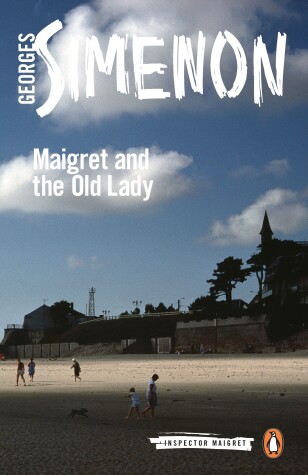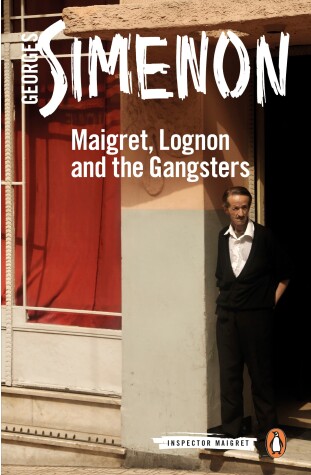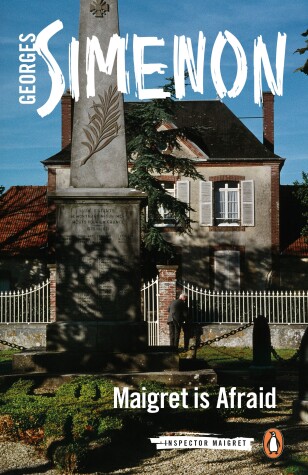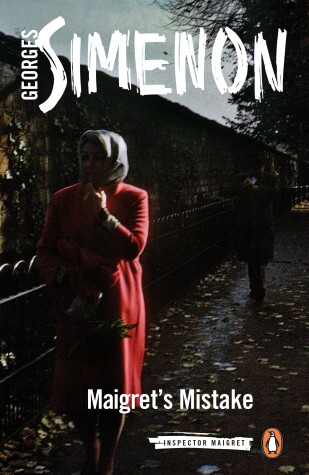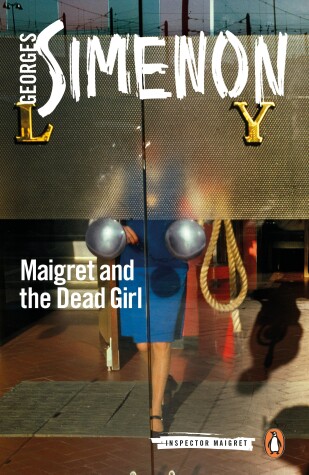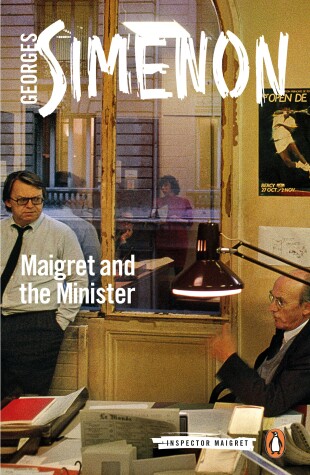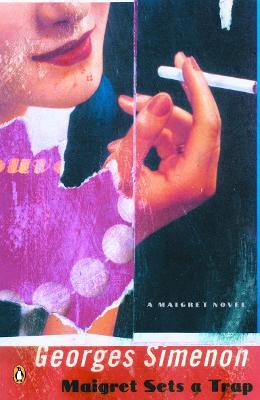Inspector Maigret
84 primary works • 86 total works
Book 32
'Compelling, remorseless, brilliant' John Gray
The FBI man was convinced, in short, that Maigret was a big shot in his own country but that here, in the United States, he was incapable of figuring out anything . . .well, Maigret happened to believe that men and their passions are the same everywhere.
Maigret is touring the United States to observe American policing methods, when a visit to a coroner's inquest in Arizona draws him into the tragic story of a young woman and five airmen in the desert.
'One of the greatest writers of the twentieth century . . . Simenon was unequalled at making us look inside, though the ability was masked by his brilliance at absorbing us obsessively in his stories' Guardian
'A supreme writer . . . unforgettable vividness' Independent
Book 33
'Compelling, remorseless, brilliant' John Gray
'He had realized that it was her eyes as much as her vivacity that made her look so young. They were of a blue that was paler than the September sky over the sea and still had an expression of surprise, of wonderment'
When a charming elderly widow appeals to him for help, Inspector Maigret travels to a seaside village in Normandy - uncovering a lost fortune and some poisonous family politics.
'One of the greatest writers of the twentieth century . . . Simenon was unequalled at making us look inside, though the ability was masked by his brilliance at absorbing us obsessively in his stories' Guardian
'A supreme writer . . . unforgettable vividness' Independent
Book 34
'Compelling, remorseless, brilliant' John Gray
When he got to his door, he was surprised not to hear any noise in the kitchen and not to smell any food. He went in, crossed the dining room, where the table had not been laid, and at last saw Madame Maigret, in her slip, busy taking off her stockings. This was so unlike her that he could find nothing to say, and when she saw him standing there wide-eyed, she burst out laughing.
Inspector Maigret's wife turns sleuth after a strange encounter in a Paris square leads her on the trail of a woman in a white hat, and towards a grisly tale of deception and greed.
Penguin is publishing the entire series of Maigret novels in new translations.
'His artistry is supreme' John Banville
'A supreme writer . . . unforgettable vividness' Independent
Book 35
'Compelling, remorseless, brilliant' John Gray
I can still see Simenon coming into my office the next day, pleased with himself, displaying even more self-confidence, if possible, than before, but nevertheless with a touch of anxiety in his eyes.'
Maigret sets the record straight and tells the story of his own life, giving a rare glimpse into the mind of the great inspector - and the writer who would immortalise him.
'One of the greatest writers of the twentieth century . . . Simenon was unequalled at making us look inside, though the ability was masked by his brilliance at absorbing us obsessively in his stories' Guardian
'A supreme writer . . . unforgettable vividness' Independent
Book 36
'Compelling, remorseless, brilliant' John Gray
'He opened the door for her and watched her walk away down the huge corridor, then hesitate at the top of the stairs. Heads turned as she passed. You sensed she came from a different world, the world of the night, and there was something almost indecent about her in the harsh light of a winter's day'
A young cabaret dancer in a black silk dress leads Maigret into a seamy world of nightclubs, drug addiction and exploitation on the streets of Montmartre.
This novel has been published in previous translations as Maigret and the Strangled Stripper and Maigret in Montmartre.
'One of the greatest writers of the twentieth century . . . Simenon was unequalled at making us look inside, though the ability was masked by his brilliance at absorbing us obsessively in his stories' Guardian
'A supreme writer . . . unforgettable vividness' Independent
Book 37
'Compelling, remorseless, brilliant' John Gray
'What he thought he had discovered, in place of the joyful candour that she usually displayed, was an irony which was neither less cheerful nor less childish, but which troubled him ... He wondered now if his exultation wasn't down to the fact that she was playing a part, not just to deceive him, not just to hide something from him, but for the pleasure of acting a part'
When one of his best inspectors is shot, Maigret decides to book himself into Mademoiselle Clément's well-kept Paris boarding house nearby in order to find the culprit.
'One of the greatest writers of the twentieth century' Guardian
'A supreme writer . . . unforgettable vividness' Independent
Book 38
'Compelling, remorseless, brilliant' John Gray
'When he had set them to work, Maigret had had a merry, almost fierce glint in his eye. He had set them loose on the house like a pack of hounds on the trail of a scent, encouraging them not with his voice, but by his whole attitude . . . would events have played out in the same manner, if the man from Rue de la Ferme hadn't been a heavyweight like him, both physically and psychologically?'
This novel has been published in previous translations as Maigret and the Burglar's Wife.
'One of the greatest writers of the twentieth century . . . Simenon was unequalled at making us look inside, though the ability was masked by his brilliance at absorbing us obsessively in his stories' Guardian
'A supreme writer . . . unforgettable vividness' Independent
Book 39
'His artistry is supreme' John Banville
'You're a good soul, inspector, and when you're up against the second-rate criminals you get here in Paris, you're a crack policeman. But this business isn't for you. These guys play rough and they may hurt you. Just drop it! What concern is it of yours, anyway?'
When Maigret learns that his hapless colleague Inspector Lognon is being menaced by some notorious American mobsters, he makes it his mission to bring them to justice - despite threatening warnings that he is out of his depth.
This novel has been published in a previous translation as Inspector Maigret and the Killers.
'A supreme writer . . . unforgettable vividness' Independent
Book 40
Book 41
Inspector Maigret must untangle the web of lies left behind by a murdered man whose family didn’t know him as well as they thought
When a man is found stabbed to death in an alley off Boulevard Saint-Martin, his identity card shows a workplace that had gone out of business three years earlier. As far as his wife knew, he still worked there, and she insists that the shoes and a tie he was wearing when he was killed “couldn’t be his.” It soon becomes evident that although he had a source of income, he spent most of his time sitting on a bench in the neighborhood, often with the same unknown man. But can Maigret find this mysterious companion?
In Maigret and the Man on the Bench, the inimitable inspector must untangle the web of a dead man’s lies that go deeper than anyone could have imagined.
Book 42
'His artistry is supreme' John Banville
'This was natural. It is the same everywhere. Rarely, however, had Maigret had such a strong sense of a clique. In a small town like this, of course there are the worthies, who are few and who inevitably meet each other several times a day, even if it is only in the street.
Then there are the others, like those who stood huddled on the sidelines looking disgruntled.'
Maigret's impromptu visit to an old college friend draws him into a murky investigation in a small provincial town ruled by snobbery, fear and intimidation.
'One of the greatest writers of the twentieth century . . . Simenon was unequalled at making us look inside, though the ability was masked by his brilliance at absorbing us obsessively in his stories' Guardian
Book 43
'Irresistible . . . so tightly wound that there's no natural place to put it down' Independent
'Maigret had questioned thousands, tens of thousands of people in the course of his career, some occupying important positions, others who were more famous for their wealth, and others still who were considered the most intelligent of international criminals.
Yet he attached an importance to this interrogation he had attached to no previous interrogation, and it wasn't Gouin's social position that overawed him, or his worldwide fame.'
'One of the greatest writers of the twentieth century . . . Simenon was unequalled at making us look inside, though the ability was masked by his brilliance at absorbing us obsessively in his stories' Guardian
Book 44
Inspector Maigret becomes entangled in the dramas of a small town on his quest to solve the murder of their former postmistress
Maigret is called from his usual duties in Paris to investigate a murder in a small village located close to La Rochelle. A local postmistress has been killed and suspicion has fallen on the local schoolmaster. When Maigret gets there, he discovers a very inward-looking community of people who hated the victim because she knew all their secrets. Maigret must determine if one of those secrets was enough to make someone into a killer.
Book 45
'His artistry is supreme' John Banville
Maigret wouldn't have admitted that what intrigued him most was the victim's face. All he had seen of it so far was one profile. Was it the bruises that gave her that sullen air? She looked like a bad-tempered little girl. Her combed-back brown hair was very smooth but naturally wavy. The rain had diluted her make-up a little and, instead of making her older or uglier, it made her younger and more appealing.
Maigret and his fellow inspector Lognon find themselves trying to out-manoeuver each other when they investigate the case of a mysterious young woman whose new life in Paris is tragically cut short.
'One of the greatest writers of the twentieth century . . . Simenon was unequalled at making us look inside, though the ability was masked by his brilliance at absorbing us obsessively in his stories' Guardian
Book 46
'His artistry is supreme' John Banville
'Once alone in his office, he went over and opened the window as if being in charge of this case made him gasp for a breath of fresh air... It made him feel almost fond of the petty thieves, maniacs, swindlers and offenders of all kinds that he usually had to deal with.'
Maigret has no taste for politics, or politicians, but when he is summoned to a clandestine meeting by a desperate government minister one evening, he finds himself drawn into an unsavoury world of corruption, scandal and cover ups.
'One of the greatest writers of the twentieth century . . . Simenon was unequalled at making us look inside, though the ability was masked by his brilliance at absorbing us obsessively in his stories' Guardian
'A supreme writer . . . unforgettable vividness' Independent
Book 47
'His artistry is supreme' John Banville
'There was no lack of picturesque individuals in a neighbourhood like Quai de Valmy. But he had seldom encountered the kind of inertia he had seen in that woman. It was hard to explain. When most people look at you, there is some sort of exchange, however small. A contact is established, even if that contact is a kind of defiance.
With her, on the contrary, there was nothing.'
The discovery of a dismembered body in the Canal Saint Martin leads Maigret into a tangled, baffling case involving a taciturn bistro-owner and a mysterious inheritance.
'One of the greatest writers of the twentieth century . . . Simenon was unequalled at making us look inside, though the ability was masked by his brilliance at absorbing us obsessively in his stories' Guardian'
Book 48
Book 49
'His artistry is supreme' John Banville
Conflict rather than harmony probably reigned in eight out of ten of the still magnificent houses that surrounded the park. But he had rarely had the opportunity to breath such a strained atmosphere as the one between these walls. Everything seemed fake, grating, starting with the lodge of the concierge-cum-manservant, who was neither a concierge nor a manservant, despite his striped waistcoat, but a former poacher, a murderer turned guard dog.
When a self-made man appeals to Maigret for protection at his lavish home, a years-old grudge from the past resurfaces and the inspector finds himself questioning his own motives.
'One of the greatest writers of the twentieth century . . . Simenon was unequalled at making us look inside, though the ability was masked by his brilliance at absorbing us obsessively in his stories' Guardian
Book 50
'His artistry is supreme' John Banville
Standing here at the window in the middle of the morning, vaguely observing the comings and goings in the street, he had a feeling that reminded of certain days in his childhood, when his mother was still alive and he was off school because he had the 'flu or it was the end of term. It was the feeling of finding out 'what went on when he wasn't there'.
Inspector Maigret is meant to be taking a holiday, but he can't resist following the development of his colleague Janvier's case in the papers - and playing a few tricks on the way.
This novel has been published in a previous translation as Maigret's Little Joke.
'One of the greatest writers of the twentieth century . . . Simenon was unequalled at making us look inside, though the ability was masked by his brilliance at absorbing us obsessively in his stories' Guardian'
Book 51
'His artistry is supreme' John Banville
Eyes half-closed, head tilted against the back of his seat, he seemed not to be thinking, as the plane flew over a thick carpet of bright clouds. In reality, he was making an effort to bring names and shadowy figures to life, names and figures that even this morning had been as unknown to him as the inhabitants of another planet.
The attempted suicide of a countess and the death of a billionaire in the same luxury Paris hotel send Maigret to the Riviera and then to Switzerland, as he searches for the truth amid the glittering world of the super-rich.
This novel has been published in a previous translation as Maigret and the Millionaires.
'One of the greatest writers of the twentieth century . . . Simenon was unequalled at making us look inside, though the ability was masked by his brilliance at absorbing us obsessively in his stories' Guardian

